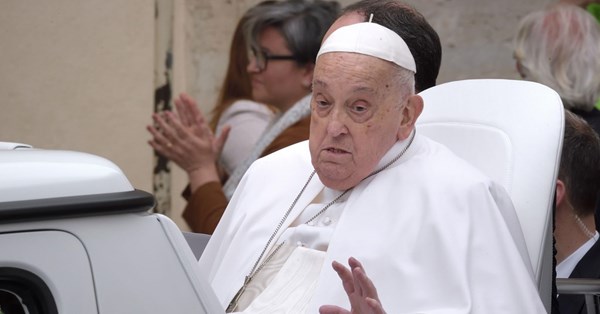THE Pope died, aged 88, early on Easter Monday, the Vatican reports.
A statement from the Camerlengo of the Apostolic Chamber, Cardinal Kevin Farrell, at around 9 a.m. said: “At 7:35 this morning (local time), the Bishop of Rome, Francis, returned to the house of the Father. His entire life was dedicated to the service of the Lord and His Church.
“He taught us to live the values of the Gospel with fidelity, courage and universal love, especially in favour of the poorest and most marginalised.”
Cardinal Farrell continued: “With immense gratitude for his example as a true disciple of the Lord Jesus, we commend the soul of Pope Francis to the infinite merciful love of the One and Triune God.”
On Easter Day, Pope Francis made a brief visit to St Peter’s Basilica, a couple hours before the Easter Vigil, to greet the faithful. His homily was delivered by Cardinal Giovanni Battista Re presiding on his behalf. In it, the Pope “reminds us that the light of the Resurrection illumines our path”.
Pope Francis had been limiting his public activities since he was discharged from the Gemelli Hospital, in Rome, on Sunday 23 March, where he had been recovering from respiratory illnesses. He had been undergoing treatment since 14 February, when he was diagnosed with bilateral pneumonia. His condition was initially not reported to be life-threatening, but he later experienced “an asthma-like respiratory crisis of prolonged intensity”, and received a blood transfusion.
Twice-daily statements on his condition were being released by the Holy See press office, and his condition was reported to remain “complex” and the prognosis “guarded” until his release.
After 38 days in hospital, the Pope returned to his Vatican residence at the Casa Santa Marta to continue his recovery.
Born Jorge Mario Bergoglio in Buenos Aires, Argentina, in 1936, he was the first Pope to have come from the Jesuit order, and the first since the eighth century to have been born or raised outside Europe. He was inspired to join the Jesuits in 1958 after recovering from severe illness. He was ordained priest in the Roman Catholic Church in 1968. He became Archbishop of Buenos Aires in 1998, and was created a Cardinal in 2001 by Pope John Paul II.
After the resignation of Pope Benedict XVI, on 28 February 2013, Archbishop Bergoglio was elected by a papal conclave, choosing his name in honour of St Francis of Assisi. Throughout his public life, Pope Francis has become known for having a less formal approach to the papacy — last year, he approved a simplified papal funeral — for his humility, emphasis on mercy, concern for the poor, and interreligious dialogue.
During his papacy, he made women full members of dicasteries in the Roman Cura, and maintained that his Church should be more sympathetic to the LGBT community. He was also vocal on issues including global diplomacy, care for creation, and the future of AI.
Millions of visitors are expected to converge on Rome in 2025 — the Church’s new Jubilee Year, which will feature religious and cultural events highlighting and fostering Christian commitment.
The Archbishop of York paid tribute to the Pope’s life and ministry shortly after the announcement on Easter Monday morning. “Francis’s whole life and ministry was centred on Jesus who comes among us not to be served, but to serve,” he said.
“We saw that compellingly in Francis’s service of the poor, his love of neighbour especially the displaced, migrant, the asylum-seeker, his deep compassion for the well-being of the earth, and his desire to lead and build the church in new ways. Francis showed us how to follow Jesus and encouraged us to go and do likewise.
“His encyclicals, writings and teachings, were supported by his deeds and actions. In their humility and focus on those in the margins, those actions, his whole life, was instantly recognisable as those of one who followed Jesus.”
Pope Francis, he said, “was acutely aware of the divisions between our Churches and how they stand in the way of seeing Jesus Christ more fully. . . He was a listening Pope whose commitment to the principle and the process of synodality will be a permanent legacy to the Roman Catholic Church and to all of us.”
Obituary to follow

















